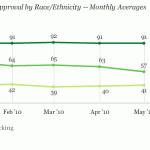In a step that edges closer to a world where all workers in America are required to possess a biometric ID card, Senator Charles Schumer (D-NY) along with Senator John Cornyn (R-TX) have proposed that anyone who buys a cell phone must first show identification.
The senators say the legislation will help fight terrorism and the drug trade, by making it easier to track down criminals. Sen. Schumer pointed out that the would-be Times Square bomber, Faisal Shahzad, had a prepaid cell phone.
But a consequence of the proposal—even though it’s not a stated goal—will be to make life much more difficult for immigrants in general, particularly the low-income and undocumented, said Valeria Treves, Executive Director of New Immigrant Community Empowerment (NICE).
“It could have a devastating impact on immigrant communities and low wage communities more broadly who use the phones, because they don’t have access to identification,” Treves said.
Its not the first time Sen. Schumer has tied national security to a call for rigid ID requirements. Biometric IDs are a fundamental element of the blueprint for immigration reform he released earlier this year.
Prepaid phones are popular in new immigrant communities. New arrivals may not have credit or the cash to sign a one or two-year phone contract. But the key issue here is privacy.
Under the new bill, retailers would be required keep records for 18 months of anyone who buys a phone.
The legislation has received few accolades in the media, as people despair the disappearing commodity of anonymity. Jim Dwyer, of the New York Times, wrote that there is a wide range of people who rely on the privacy granted by prepaid phones, from doctors to celebrities to journalists.
But for undocumented immigrants, its often the only type of phone they can purchase, because under the current law they are not required to show a government-issued ID.
“It’s an infringement on their rights as consumers. One basic right is a right to service, and you shouldn’t have to have an ID to get service,” Treves said.
Treves says passage of the bill would simply result in the growth of the black market, since phones are practically mandatory for life in the U.S. People who don’t have IDs will be forced to rely on those who do, and will end up paying higher prices for the phones.
“It will become even more expensive to be poor and undocumented,” Treves predicted.





